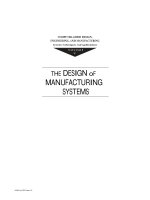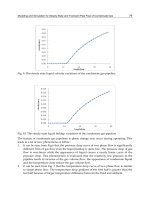The Design of Manufacturing Systems Part 1 pdf
Bạn đang xem bản rút gọn của tài liệu. Xem và tải ngay bản đầy đủ của tài liệu tại đây (118.17 KB, 5 trang )
COMPUTER-AIDED DESIGN,
ENGINEERING, AND MANUFACTURING
Systems Techniques And Applications
THE
DESIGN
oF
MANUFACTURING
SYSTEMS
VOLUME
V
© 2001 by CRC Press LLC
COMPUTER-AIDED DESIGN,
ENGINEERING, AND MANUFACTURING
Systems Techniques And Applications
VOLUME
Editor
CORNELIUS LEONDES
Boca Raton London New York Washington, D.C.
CRC Press
THE DESIGN OF
MANUFACTURING
SYSTEMS
V
This book contains information obtained from authentic and highly regarded sources. Reprinted material is
quoted with permission, and sources are indicated. A wide variety of references are listed. Reasonable efforts
have been made to publish reliable data and information, but the author and the publisher cannot assume
responsibility for the validity of all materials or for the consequences of their use.
Neither this book nor any part may be reproduced or transmitted in any form or by any means, electronic or
mechanical, including photocopying, microfilming, and recording, or by any information storage or retrieval
system, without prior permission in writing from the publisher.
The consent of CRC Press LLC does not extend to copying for general distribution, for promotion, for creating
new works, or for resale. Specific permission must be obtained in writing from CRC Press LLC for such
copying.
Direct all inquiries to CRC Press LLC, 2000 N.W. Corporate Blvd., Boca Raton, Florida 33431.
Trademark Notice:
Product or corporate names may be trademarks or registered trademarks, and are used
only for identification and explanation, without intent to infringe.
© 2001 by CRC Press LLC
No claim to original U.S. Government works
International Standard Book Number 0-8493-0997-2
Printed in the United States of America 1 2 3 4 5 6 7 8 9 0
Printed on acid-free paper
Library of Congress Cataloging-in-Publication Data
Catalog record is available from the Library of Congress.
Preface
A strong trend today is toward the fullest feasible integration of all elements of manufacturing, including
maintenance, reliability, supportability, the competitive environment, and other areas. This trend toward
total integration is called concurrent engineering. Because of the central role information processing
technology plays in this, the computer has also been identified and treated as a central and most essential
issue. These are the issues that are at the core of the contents of this volume.
This set of volumes consists of seven distinctly titled and well-integrated volumes on the broadly
significant subject of computer-aided design, engineering, and manufacturing: systems techniques and
applications. It is appropriate to mention that each of the seven volumes can be utilized individually. In
any event, the great breadth of the field certainly suggests the requirement for seven distinctly titled and
well-integrated volumes for an adequately comprehensive treatment. The seven volume titles are:
1. Systems Techniques and Computational Methods
2. Computer-Integrated Manufacturing
3. Operational Methods in Computer-Aided Design
4. Optimization Methods for Manufacturing
5. The Design of Manufacturing Systems
6. Manufacturing Systems Processes
7. Artificial Intelligence and Robotics in Manufacturing
The contributors to this volume clearly reveal the effectiveness and great significance of the techniques
available and, with further development, the essential role that they will play in the future. I hope that
practitioners, research workers, students, computer scientists, and others on the international scene will
find this set of volumes to be a unique and significant reference source for years to come.
Cornelius T. Leondes
Editor
© 2001 by CRC Press LLC
1
Long-Range Planning
of Chemical
Manufacturing
Systems
1.1 Introduction
1.2 The Long-Range Planning Problem
General Formulation
1.3 Deterministic Models
An MILP Model • Extensions of the MILP Model
1.4 Hedging against Uncertainty
Sources and Consequences of Uncertainty • Fuzzy
Programming • Stochastic Programming • Fuzzy (FP) vs.
Stochastic Programming (SP)
1.5 Conclusions
1.1 Introduction
Recent years have witnessed increasingly growing awareness for long-range planning in all sectors.
Companies are concerned more than ever about long-term stability and profitability. The chemical
process industries is no exception. New environmental regulations, rising competition, new technology,
uncertainty of demand, and fluctuation of prices have all led to an increasing need for decision policies
that will be ‘‘best” in a dynamic sense over a wide time horizon. Quantitative techniques have long
established their importance in such decision-making problems. It is, therefore, no surprise that there is
a considerable number of papers in the literature devoted to the problem of long-range planning in the
processing industries. It is the purpose of this chapter to present a summary of recent advances in this
area and to suggest new avenues for future research.
The chapter is organized in the following manner. Section 1.2 presents the long-range planning problem.
Section 1.3 discusses deterministic models and solution strategies. Models dealing with uncertainty are
discussed in Section 1.4. Finally, some recommendations for future research and concluding remarks are
presented in Section 1.5.
1
Address all correspondence to this author (e-mail: ).
Shabbir Ahmed
Georgia Institute of Technology
Nikolaos V. Sahinidis
1
University of Illinois
at Urbana-Champaign
© 2001 by CRC Press LLC









